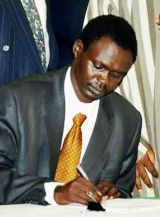FACTBOX- Darfur peace process
Some Questions and Answers About Darfur
May 5, 2006 — Two years of peace talks culminated Friday with a Darfur peace treaty accepted by the government and the main rebel group. Some questions and answers about the process.
Q. What next?
 A. Implementing the accord could prove difficult. Two smaller rebel groups have refused to sign and may keep fighting. Both the rebel and government sides, fighting for three years, have repeatedly failed to live up to agreements. A cease-fire signed in 2004 is in tatters. A robust U.N. peacekeeping force to replace thousands of African Union troops could help keep the peace. The Sudanese government had earlier refused to accept U.N. peacekeepers, but Friday indicated it would welcome such a force.
A. Implementing the accord could prove difficult. Two smaller rebel groups have refused to sign and may keep fighting. Both the rebel and government sides, fighting for three years, have repeatedly failed to live up to agreements. A cease-fire signed in 2004 is in tatters. A robust U.N. peacekeeping force to replace thousands of African Union troops could help keep the peace. The Sudanese government had earlier refused to accept U.N. peacekeepers, but Friday indicated it would welcome such a force.
Q. Could U.N. troops be deployed soon?
A. No. The U.N. must first send experts to determine what kind of force is needed – and the Sudanese have so far refused to give the U.N. visas to conduct such an assessment. Then the U.N. must come up with options to be presented to the Security Council for approval. Once the council approves, the U.N. peacekeeping department starts contacting nations about contributing troops. So far, no countries have indicated they would take part, though the U.S. has been a chief proponent of the idea. NATO is expected to provide only logistical support and training.
Q. What led to Friday’s breakthrough?
A. The African Union, which has been mediating the talks for two years, demanded in March that the parties agree to a peace proposal it had drafted by April 30. The Security Council endorsed the deadline. The Sudanese government accepted the African Union draft, but the rebels rejected it hours before the April 30 deadline. Then a top U.S. envoy and a British Cabinet minister flew to Abuja to put pressure on the rebels and to fine-tune the African Union draft to meet some rebel concerns.
Q. What are the main provisions of the peace treaty?
A. A cease-fire, disarmament of militias linked to the government and accused of some of the war’s worst atrocities, integration of thousands of rebel fighters into Sudan’s armed forces, protection force for civilians, establishment of a reconstruction and development fund and provisions to compensate war victims.
Political provisions include guarantees that rebel factions will have the majority in Darfur’s three state legislatures; the rebels did not get the national vice presidency they had sought.
Q. What prompted some rebels to reject it?
A. Demands for a vice president’s spot as opposed to a top presidential adviser from Darfur and concerns that security and compensation for war victims were not guaranteed.
Q. How will a peace treaty affect humanitarian concerns?
A. Aid groups say fighting between rebel and government forces and among rebel factions not only threatens civilians, but has made it almost too dangerous for them to do their work. That would change if the cease-fire is respected, and, if it is implemented in time, villagers could return to their fields for planting season. In addition, optimism sparked by a peace treaty might encourage international donors to step up funding for humanitarian work. U.N. and other aid agencies working in Darfur have had to drastically cut feeding and other programs because donors weary of the war have ignored repeated pleas for funding.
Already, at least 180,000 people have been killed and more than 2 million forced to flee their homes in what the United Nations has called one of the world’s worst humanitarian crisis.
Q. What are the origins of the conflict?
A. The rebels, with their support bases in Darfur’s ethnic African tribes, took up arms in early 2003, accusing Sudan’s Arab-dominated central government of neglecting an impoverished region that had seen decades of tribal clashes over land and water. The government is accused of responding by unleashing ethnic Arab militia on African civilians, a charge it denies but that led to accusations of genocide.
Tension between Arab and African ethnic groups and between the autocratic center and the rest of the country have repeatedly erupted into violence in Sudan.
Q. Could the Darfur conflict spread?
A. It already has. Chadian rebels have taken advantage of the chaos to prepare their rebellion in the region where Chad and Darfur meet and Chad’s president says they are backed by Sudan. Reports from the Central African Republic say armed opponents of that government also are using the Darfur region as a staging ground. Refugee movement has put a strain on resources and stability. And Osama bin Laden recently urged his followers to go to Sudan to fight the proposed U.N. presence.
(ST/AP)
– For the text of the Agreement please go at http://www.sudantribune.com/IMG/doc/Darfur_Peace_Agreement_as_of_20060425.doc
